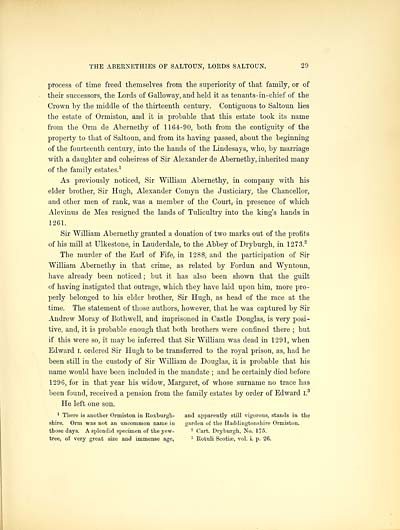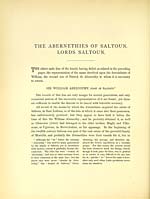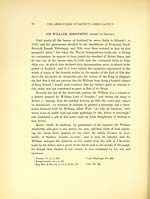Frasers of Philorth > Volume 2
(43)
Download files
Complete book:
Individual page:
Thumbnail gallery: Grid view | List view

THE ABERNETHIES OP SALTOUN, LORDS SALTOUN. 29
process of time freed themselves from the superiority of that family, or of
their successors, the Lords of Galloway, and held it as tenants- in- chief of the
Crown by the middle of the thirteenth century. Contiguous to Saltoun lies
the estate of Ormiston, and it is probable that this estate took its name
from the Orm de Abernethy of 1164-90, both from the contiguity of the
property to that of Saltoun, and from its having passed, about the beginning
of the fourteenth century, into the hands of the Lindesays, who, by marriage
with a daughter and coheiress of Sir Alexander de Abernethy, inherited many
of the family estates. 1
As previously noticed, Sir William Abernethy, in company with his
elder brother, Sir Hugh, Alexander Comyn the Justiciary, the Chancellor,
and other men of rank, was a member of the Court, in presence of which
Alevinus de Mes resigned the lands of Tulicultry into the king's hands in
1261.
Sir William Abernethy granted a donation of two marks out of the profits
of his mill at Ulkestone, in Lauderdale, to the Abbey of Dryburgh, in 1273. 2
The murder of the Earl of Fife, in 1288, and the participation of Sir
William Abernethy in that crime, as related by Fordun and Wyntoun,
have already been noticed ; but it has also been shown that the guilt
of having instigated that outrage, which they have laid upon him, more pro-
perly belonged to his elder brother, Sir Hugh, as head of the race at the
time. The statement of those authors, however, that he was captured by Sir
Andrew Moray of Bothwell, and imprisoned in Castle Douglas, is very posi-
tive, and, it is probable enough that both brothers were confined there ; but
if this were so, it may be inferred that Sir William was dead in 1291, when
Edward I. ordered Sir Hugh to be transferred to the royal prison, as, had he
been still in the custody of Sir William de Douglas, it is probable that his
name would have been included in the mandate ; and he certainly died before
1296, for in that year his widow, Margaret, of whose surname no trace has
been found, received a pension from the family estates by order of Edward I. 3
He left one son.
1 There is another Ormiston in Roxburgh- and apparently still vigorous, stands in the
shire. Orm was not an uncommon name in garden of the Haddingtonshire Ormiston.
those days. A splendid specimen of the yew- 2 Cart. Dryburgh, No. 175.
tree, of very great size and immense age, s Rotuli Scotia?, vol. i. p. 26.
process of time freed themselves from the superiority of that family, or of
their successors, the Lords of Galloway, and held it as tenants- in- chief of the
Crown by the middle of the thirteenth century. Contiguous to Saltoun lies
the estate of Ormiston, and it is probable that this estate took its name
from the Orm de Abernethy of 1164-90, both from the contiguity of the
property to that of Saltoun, and from its having passed, about the beginning
of the fourteenth century, into the hands of the Lindesays, who, by marriage
with a daughter and coheiress of Sir Alexander de Abernethy, inherited many
of the family estates. 1
As previously noticed, Sir William Abernethy, in company with his
elder brother, Sir Hugh, Alexander Comyn the Justiciary, the Chancellor,
and other men of rank, was a member of the Court, in presence of which
Alevinus de Mes resigned the lands of Tulicultry into the king's hands in
1261.
Sir William Abernethy granted a donation of two marks out of the profits
of his mill at Ulkestone, in Lauderdale, to the Abbey of Dryburgh, in 1273. 2
The murder of the Earl of Fife, in 1288, and the participation of Sir
William Abernethy in that crime, as related by Fordun and Wyntoun,
have already been noticed ; but it has also been shown that the guilt
of having instigated that outrage, which they have laid upon him, more pro-
perly belonged to his elder brother, Sir Hugh, as head of the race at the
time. The statement of those authors, however, that he was captured by Sir
Andrew Moray of Bothwell, and imprisoned in Castle Douglas, is very posi-
tive, and, it is probable enough that both brothers were confined there ; but
if this were so, it may be inferred that Sir William was dead in 1291, when
Edward I. ordered Sir Hugh to be transferred to the royal prison, as, had he
been still in the custody of Sir William de Douglas, it is probable that his
name would have been included in the mandate ; and he certainly died before
1296, for in that year his widow, Margaret, of whose surname no trace has
been found, received a pension from the family estates by order of Edward I. 3
He left one son.
1 There is another Ormiston in Roxburgh- and apparently still vigorous, stands in the
shire. Orm was not an uncommon name in garden of the Haddingtonshire Ormiston.
those days. A splendid specimen of the yew- 2 Cart. Dryburgh, No. 175.
tree, of very great size and immense age, s Rotuli Scotia?, vol. i. p. 26.
Set display mode to:
![]() Universal Viewer |
Universal Viewer | ![]() Mirador |
Large image | Transcription
Mirador |
Large image | Transcription
Images and transcriptions on this page, including medium image downloads, may be used under the Creative Commons Attribution 4.0 International Licence unless otherwise stated. ![]()
| Histories of Scottish families > Frasers of Philorth > Volume 2 > (43) |
|---|
| Permanent URL | https://digital.nls.uk/96570772 |
|---|
| Attribution and copyright: |
|
|---|---|
| Description | A selection of almost 400 printed items relating to the history of Scottish families, mostly dating from the 19th and early 20th centuries. Includes memoirs, genealogies and clan histories, with a few produced by emigrant families. The earliest family history goes back to AD 916. |
|---|

